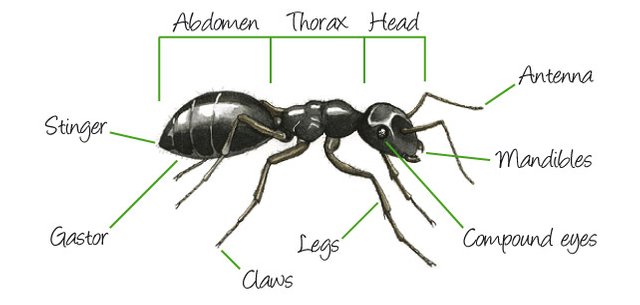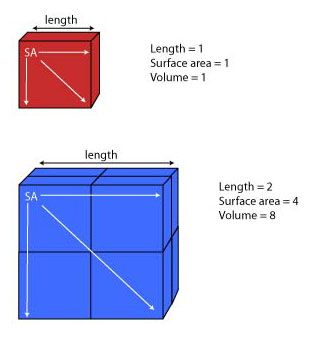Another fact of the ants: they are stronger than their bodies
Ant anatomy. Image source
I never imagined an ant able to carry a load 50 times the size of its body. We often see ants carrying food. The ants we see are female ants. Yup, female ants are the type of worker ants. While the male ants do not work, they are only tasked to marry "the queen". You will definitely think this is unfair. The male ants should also work to supply food for their colony. But, you do not underestimate the power of female ants.
Basically, ants can carry heavier loads than their body size with a range of between 10 and 50 fold, even more. This relates to the respiratory system and laws of physics. Let's see how the ants breathe!

Ants have respiratory system that consists of spiracles and respiratory ducts called trachea. Trachea is a respiratory system consisting of vessels that branch out throughout the body. Spiracles are tiny openings located on the outside of the exoskeleton and function to transport oxygen into and carbon dioxide out of the ant’s tracheal system. Ants don’t have lungs. They breathing through tiny holes in their sides – spiracles – one pair per segment. These lead into a network of tiny tubes – tracheae – permeating their entire body, getting narrower and narrower, supplying air, right to the tissues that use it, rather than using blood to transport it like us. Though they can open and close their spiracles, they have little ability to pump air in and out, which happens just through general movement. It’s this inability that stops insects getting as big as us, with our ultra-efficient lungs and blood.
Through this breathing system, the amount of oxygen received in the body of ants is much higher than the amount of oxygen in the human body. With the high amount of oxygen in the body of the ant, the power of an ant is stronger than the human. The logic is that the less amount of oxygen is received when working, it will make us weaker and decrease the strength.
Illustration of area ratio Image source
In general, the smaller the creature, the stronger it becomes. In physics, you need to understand a few basic measurements of size, mass, and strength:
- The strength of a muscle is proportional to the surface area of its cross section.
- Surface area is a two-dimensional measurement, and is proportional to the square of its length.
- Volume is a three-dimensional measurement, and is proportional to the cube of its length.
The point of this law is about scaling. The strength of an animal is related to the surface area, which will increase in proportion to the square length, or by a factor of 3. But its strength is related to surface area, which only increases in proportion to the square of its length, or by a factor of 2. Larger animals have a greater difference between mass and strength. When a large animal needs to lift an object, its muscle must also move a larger volume or mass of its own body. This source also states almost the same thing, surface area does not scale proportionally with volume; for every unit increase in the size of something, surface area increases by length2, but volume increases by length3, meaning that the surface area to volume ratio decreases. Surface area (e.g. skin) to total volume (e.g. the body) is a significant quantity in biological terms. For example, most vertebrates use lungs to obtain oxygen from the air, because this organ has an exceptionally high surface area to volume ratio, meaning that very large quantities of oxygen can be absorbed. Smaller animals, such as insects, don’t have lungs, but instead use a series of connected tubes, called spiracles, to collect oxygen from the air.
Another study of heavy lifter ants also revealed that the neck joint of a common American field ant can withstand pressures up to 5,000 times greater than its own body weight.
"Ants are impressive mechanical systems - astounding, really," said Carlos Castro, a professor of mechanical and aerospace engineering at Ohio State.
In this research, they chose the Allegheny mound ant (Formica exsectoides), a common ant not particularly know for its ability to lift. This concept is similar to a spinning carnival ride where passengers are pinned to the wall of the ride by centrifugal force as the floor drops out from beneath them.
"In the case of the ants, their heads were glued in place on the floor of the centrifuge, so that as it spun, the ants' bodies would be pulled outward until their necks ruptured," the university said in a statement. "The centrifuge spun up to hundreds of rotations per second, each increase in speed exerting more outward force on the ant. At forces corresponding to 350 times the ants' body weight, the neck joint began to stretch and the body lengthened. The ants' necks ruptured at forces of 3,400-5,000 times their average body weight."
From some of the above views, I conclude the strength of an animal is related to the surface area, which will increase in proportion to the square length, or by a factor of 3. But its strength is related to surface area, which only increases in proportion to the square of its length, or by a factor of 2. In addition, the amount of oxygen received by the ant also greatly affects its strength. These two things make a small ant able to carry a load over its size. Morally, the power of these ants teaches us not to underestimate the small creatures. []
Thankx Good Information Share :)
The ant is a despicable beast with superior military strength.
@zycr22 is the ant whisperer to me but this was informative. At least he'll be happy ti see another ant lover
And I always thought it was the male ants that did all the work.
I actually wrote a poem about ants (fire ants) if you care to read it.
https://steemit.com/poetry/@johnwjr7/5d4xvn-fire-ants
nice share my brother...
Postingan yang luar biasa @teukumukhlis, terima kasih telah berbagi
Cool info, though I don't think it has any moral implication.
Wow, that's a lot of information's. I never think about why ants are so strong, and newer connected ant's strength with oxygen. As a sportsman I know that human strength is generally related with oxygen consumption and use.
Again thank you for this very interesting and informative article!
Wow, so cool they get air through holes in the body, no lungs. And that strength, I don't really get the math but just hope they stay small.